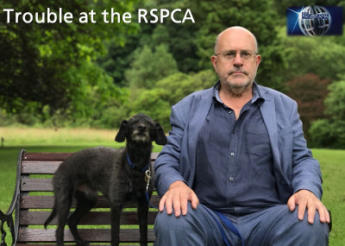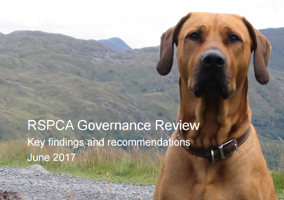The RSPCA has been labelled “not fit for purpose” by a former senior manager and accused of conflicts of interest on the BBC show Panorama.
The episode, titled Trouble at the RSPCA, was shown last night and questioned whether the RSPCA is doing enough to “keep public trust”.
The charity published a comprehensive response on its website yesterday, saying the programme was misleading.
The programme highlighted three cases where animal owners felt the charity had been heavy-handed in dealing with them, and questioned whether the charity’s governance arrangements were appropriate.
As part of the part of the programme, the former national director of RSPCA Wales, Steve Carter, said that a trustee, David Canavan – who was acting chief executive at the time, had encouraged resources to be diverted from the RSPCA’s main Manchester Animal Hospital to the Rochdale branch, where Canavan was a trustee.
Carter said he thought this amounted to a conflict of interest and was part of the reason he left RSPCA.
“I personally think that the RSPCA, currently, is not fit for purpose,” Carter told Panorama. “It stems from the background of Council [the RSPCA’s trustees]. I don’t think the governance, structure and process has moved on much since the 1970s.”
RSPCA denies the allegations that the RSPCA Manchester hospital was at risk of closure at that time or that there was "improper interference" from Canavan.
In a statement the charity said: "These allegations are totally untrue. Following a number of meetings in the North and Midlands region, the concept of five or six ‘hubs’ was developed, which included the suggestion veterinary services could be redistributed across the regions. Rochdale was identified as one of several hubs but the concept was not followed through by the RSPCA. There was no improper interference by Mr Canavan in this issue. The Greater Manchester Animal Hospital was and remains a key part of the RSPCA’s operations in the area and there was never any prospect that it would close."
‘So unusual’
Andrew Hind, former chief executive of the Charity Commission, took part in the show.
He said the chances of donations being “well spent” were “significantly higher” if the charity is “well-governed and well-led”.
Hind said trustees in large charities “shouldn’t really dabble in operational measures – that’s for paid staff”.
He described the RSPCA’s arrangement where Canavan, a trustee, had been acting chief executive for two years, as “off the scale – in terms of being so unusual”.
“I find it difficult to see how a large charity could properly run itself if it doesn’t have a permanent chief executive who is independent from the non-executive trustee team” he said.
‘Micro-management’
A former trustee, Chris Laurence, who had also been the charity’s chief vet, was also interviewed.
While he described the charity as a “great organisation” where staff work “incredibly hard”, he said he had left because “you come to the point where you have to say ‘enough is enough’”.
He said he could no longer support the way it was being run. “Council finds it really difficult to properly delegate,” he explained, adding that there was “almost micro-management” by trustees.
Charity Commission says RSPCA is ‘below standard’
The Charity Commission provided a statement to Panorama reiterating that it is working with the RSPCA to improve its governance, which it considers to be “below the standard we expect in a modern charity”. It said the charity needs to change its culture.
The Commission's full statement reads: “The RSPCA is one of Britain’s most well-known and best-loved charities. It has a proud history, stretching back over nearly two centuries, and a large membership, and it continues to fulfil important functions in our society today. The charity, its members and supporters and the wider public have a shared interest in a stable future for the RSPCA and the effective discharge of its animal welfare work. The Commission, as the charity regulator, seeks to ensure that the administration and management of the charity by the trustees is meeting those needs.
“Sadly, at this time, the charity’s governance is below the standard we expect in a modern charity. This was brought into focus by the recent departure of the CEO, and is highlighted in the recommendations of an independent governance review, which the Commission ensured the charity carried out. We have made clear to the charity’s trustees that they must act quickly to put the charity’s recent difficulties behind them and put the RSPCA onto a secure governance footing. The trustees have submitted an action plan, based on that governance review, which we are considering.
“The changes needed at the RSPCA involve practical steps, but they also require a commitment to culture change. This must come from the very top. We are monitoring the trustees’ role in leading that change, and in implementing the action plan, to ensure they maintain the necessary grip and pace. We will consider further regulatory action should we not see the required improvements made quickly enough.”
RSPCA response
The RSPCA said that the programme was “misleading”.
The charity accused the BBC of “focusing on a small number of prosecution cases, handpicked for sensationalism, as well as the governance of the organisation”.
The statement continued: “Whilst we do not accept the intended portrayal by Panorama, we aren’t complacent about any aspect of the working or leadership of the organisation.
“We’re committed to continually improving everything we do as an organisation because we know that is the best way to achieve our charitable objectives of helping animals and people.”
It said there are occasions where it gets things wrong, and that it is committed to acting on the recommendations of the recent governance report.
The full statement is on its website.
Disclosure: Andrew Hind is a member of Civil Society Media's board as director and executive editor
Editor's note: This article was updated on 7 August to inlcude RSPCA's response regarding the Manchester animal hospital
Related Articles












